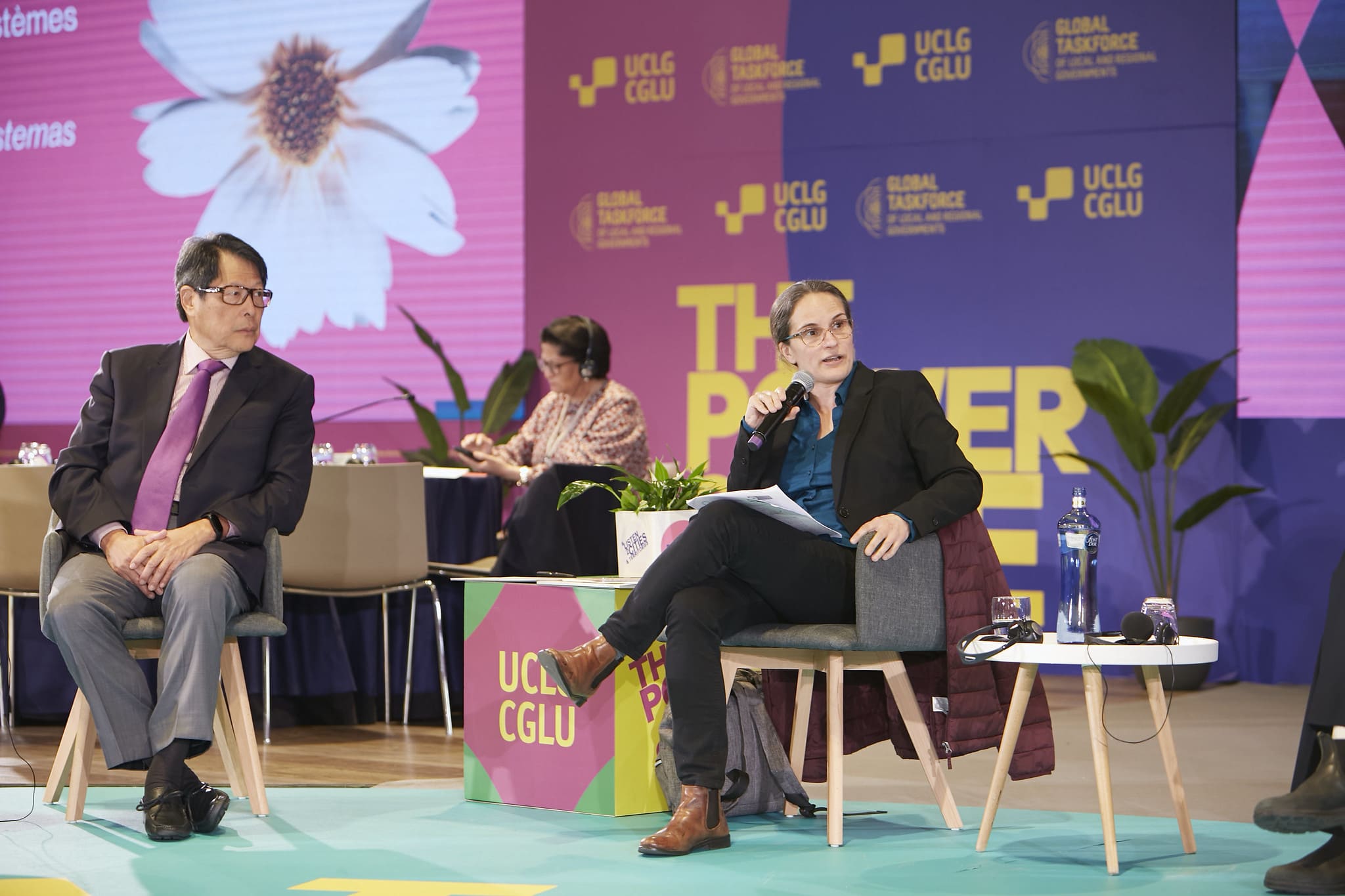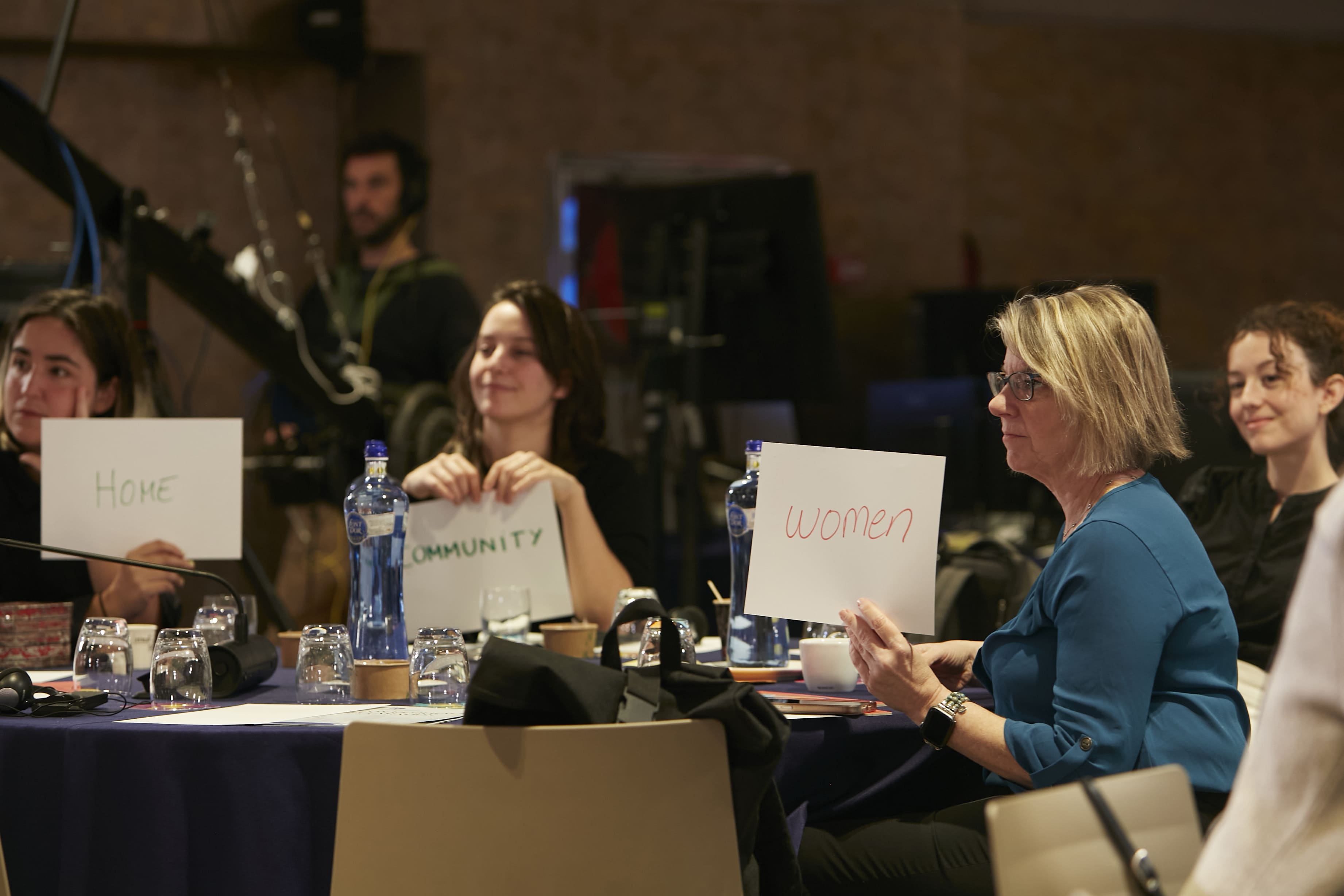The launch of three pilot UCLG facilities instruments was the core of the discussion during the fourth day of the 2024 UCLG retreat. After a moment to “Thinking Big,” which set the stage for the introduction of these instruments,” the Local4Action, Women, and Caring Systems facilities were kicked off in different sessions where participants mapped characteristics, objectives, synergies, and potential contributions to impact the global agenda from the local level.
The UCLG Facilities will be essential to trigger change, strengthening the network’s efforts to bring critical political local agendas to the forefront and reshape development global action. They represent UCLG’s contribution to the SDG Rescue Plan and respond to a context of interlinked crises. They will play into the network’s strengths by bringing together UCLG leadership, partners, coalitions, and different work teams.
Secretary General of UCLG, Emilia Saiz, said, “Our strength lies in spaces like this, connecting one area with another so that all can communicate, creating transversal efforts. The Facilities are new instruments fed by all our talents and initiatives, empowering those already working and creating mission-driven objectives.”
Participants noted their expectations around the facilities in the first brainstorming session of the morning, including engagement, understanding of citizens, dreaming big, connection, sharing, co-learning, implementation focus and inclusivity. “Contribute with your experience and align what you are doing,” moderator Sara Hoeflich encouraged everyone.
The session on the UCLG Caring Systems Facility started with an exercise encouraging participants to share their different meanings for “care” to bring a new layer to the discussion, understanding care as a value to base policies and addressing the people who deliver and need care. Some answers were empathy, love, women, protection, work, responsibility and leaving no one behind.
Care systems have emerged as a central focus of the agenda of UCLG. Care has been integral to developing and adopting the Pact for the Future of Humanity in the 7th UCLG World Congress held in Daejeon, Korea, in 2022.
The UCLG Caring Systems Facility aims to be a transformative force, consolidating and amplifying efforts to bring care to the forefront of global discourse and an open space that can bring together the UCLG ecosystem and the partners advancing the care agenda. The Facility advocates for a paradigm shift in the discourse surrounding care. It asserts that a shift towards a broader city- and region-wide perspective is imperative to build a just and sustainable world.
Lorena Zárate, Co-Founder and Member of the Support Team of the Global Platform for the Right to the City, opened the discussion by exploring the meaning of care within urban and regional contexts. She stressed that “taking care of life is essential.” Moving towards a city of care requires changes in three fundamental elements: the physical environment, the political sphere, and the economy.
Nicolas You, Executive Director of the Guangzhou Institute for Urban Innovation, drew upon submissions to the 6th Guangzhou Award to illuminate the primary pathways cities employ to promote care. He noted that over one-third of the shortlisted initiatives for the award were care-related, marking the first time in the Awards’ history that one topic dominated. He further illustrated his point with examples from Bogotá, Bontang, São Paulo, and Gwangju.
Continuing the discussion, Ana Moreno, Technical Secretary of the Global Alliance for Care, underscored how the Alliance’s multistakeholder, open and flexible platform could provide a solid foundation for the UCLG Caring Systems Facility. This includes co-creation and collaborative approaches to capacity building, research, and advocacy. She also invited UCLG and its partners to bring the care and territorial dimension to the Alliance as one of the most relevant dimensions needed to put care at the centre and to influence the global and multilateral next cycle of agreements.

Echoing previous speakers, Jordi Vaquer, Secretary General of Metropolis, stressed that the “political moment has come to put care at the centre.” He elaborated on how the Metropolis’ Care Campaign has gained momentum under the political leadership of women mayors who have prioritised care. He further stressed that no one-size-fits-all approach to incorporating care in different regions exists, but Metropolis members work together to exchange good practices.
Yves Cabannes, Emeritus Professor of Development Planning, University College London, highlighted the relationship between participatory democracy and caring systems. He stressed the importance of adopting a care-based approach in urban policymaking to strengthen local democracy. Cabannes emphasised the potential of participatory budgeting in including communities in decision-making at the local level. “We need more participatory democracy if we want policies on care,” he concluded.
Addressing the importance of collaboration between places, Tom Mitchell, Executive Director of the International Institute for Environment and Development (IIED), highlighted that research can serve as foresight and urged the Facility to be “an opportunity to unite and bring people together.”
Philippe Malaisé, Deputy Secretary General of INTERCO-CFDT & PSI, highlighted the importance of recognising the professional care workers whom the local government predominantly employs. He underscored that “by improving the workers’ lives, we can improve the services provided to the whole of society.”
Finally, Carlos de Freitas, Special Advisor of FMDV, noticed that transforming care into institutions is a complex challenge, especially concerning finance. He highlighted, “When it comes to finance, we need to think about the care economy and the social economy.” He suggested that “localisation is a new form of globalisation.”
UCLG’s Caring Systems Facility has the potential to consolidate efforts and lead in putting the care agenda within localisation action and policy-making. With collaborative efforts and a commitment to transformative action, the vision of a caring world can be realised, where the principles of care permeate every aspect of society, fostering greater well-being and resilience for all.


 This publication was produced with the financial support of the European Union. Its contents are the sole responsibility of UCLG and do not necessarily reflect the views of the European Union.
This publication was produced with the financial support of the European Union. Its contents are the sole responsibility of UCLG and do not necessarily reflect the views of the European Union.